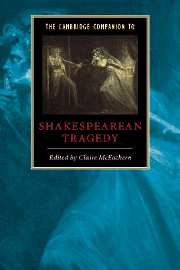Book contents
- Frontmatter
- 1 What is a Shakespearean tragedy?
- 2 The language of tragedy
- 3 Tragedy in Shakespeare’s career
- 4 Shakespearean tragedy printed and performed
- 5 Religion and Shakespearean tragedy
- 6 Tragedy and political authority
- 7 Gender and family
- 8 The tragic subject and its passions
- 9 Tragedies of revenge and ambition
- 10 Shakespeare’s tragedies of love
- 11 Shakespeare’s classical tragedies
- 12 The critical reception of Shakespeare’s tragedies
- 13 Antony and Cleopatra in the theatre
- Select bibliography
- Index
- Series List
2 - The language of tragedy
Published online by Cambridge University Press: 28 May 2006
- Frontmatter
- 1 What is a Shakespearean tragedy?
- 2 The language of tragedy
- 3 Tragedy in Shakespeare’s career
- 4 Shakespearean tragedy printed and performed
- 5 Religion and Shakespearean tragedy
- 6 Tragedy and political authority
- 7 Gender and family
- 8 The tragic subject and its passions
- 9 Tragedies of revenge and ambition
- 10 Shakespeare’s tragedies of love
- 11 Shakespeare’s classical tragedies
- 12 The critical reception of Shakespeare’s tragedies
- 13 Antony and Cleopatra in the theatre
- Select bibliography
- Index
- Series List
Summary
In the middle of The Second Part of King Henry the Fourth, during the long nocturnal tavern scene, Shakespeare abruptly alters the elegiac mood by introducing a new character – Pistol. Significantly, his entrance is announced in advance: as soon as his name is mentioned Doll Tearsheet denounces him as 'a swaggering rascal' and 'the foul-mouthed'st rogue in England'. Her complaint instantly identifies his essential attribute, for like so many secondary characters in the second tetralogy, Pistol speaks a distinctive language.
PISTOL What, shall we have incision? Shall we imbrue?
[Snatches up his sword.]
Then Death rock me asleep, abridge my doleful days!
Why then, let grievous ghastly gaping wounds
Untwind the sisters three; come, Atropos, I say!
HOSTESS Here’s goodly stuff toward!
(2.4. 157–61)‘Stuff’ indeed. Attempting to pass himself off as a valiant warrior, the coward has filched the rhetoric of a hero, and we need look no further for the source of his grandiloquent speech than the Elizabethan playhouse.
- Type
- Chapter
- Information
- The Cambridge Companion to Shakespearean Tragedy , pp. 23 - 49Publisher: Cambridge University PressPrint publication year: 2003
- 1
- Cited by

